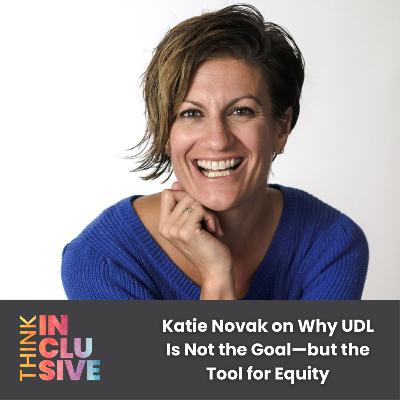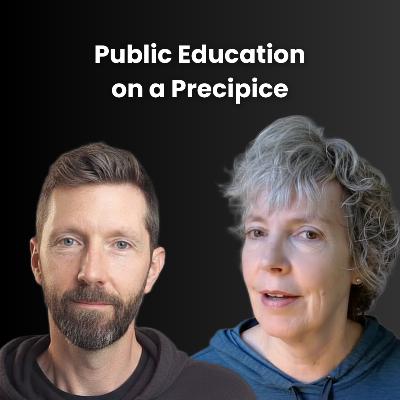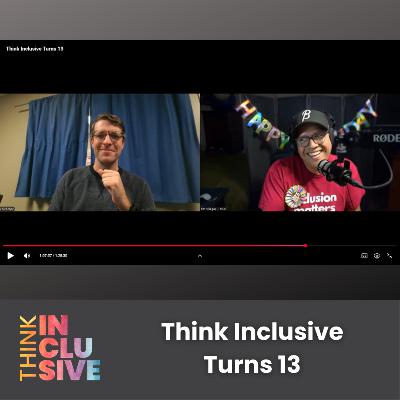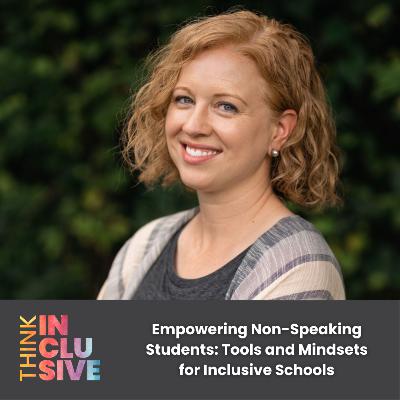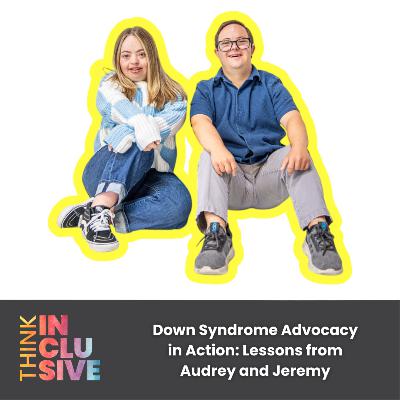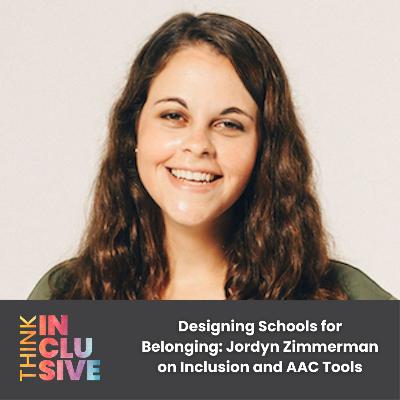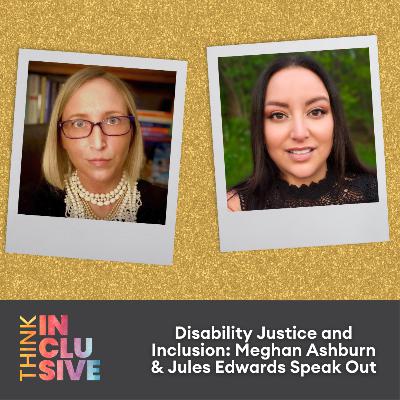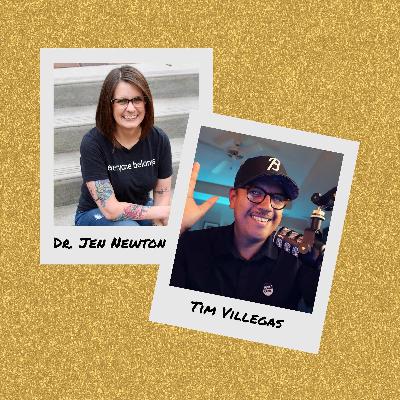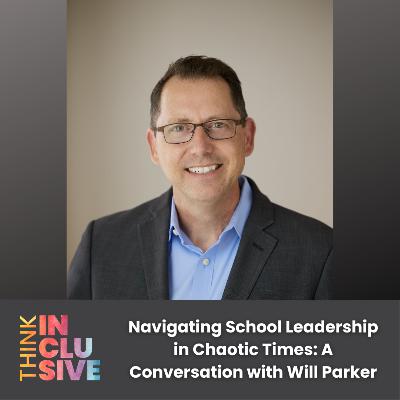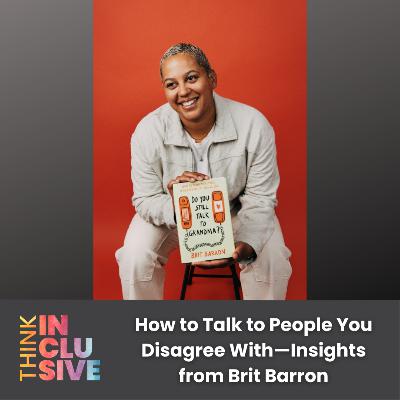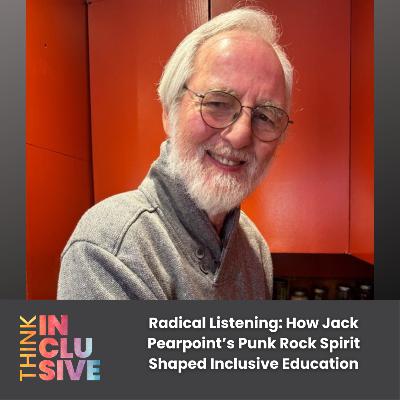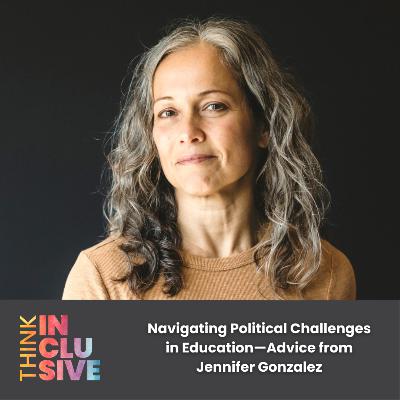Discover Think Inclusive
Think Inclusive

217 Episodes
Reverse
Dr. Jennifer Spencer-Iiams is a prominent educational leader with a focus on transformative change in school inclusion practices. Serving as Deputy Superintendent in a medium-sized school district in Oregon, she co-authored "Leading for All: How to Create Truly Inclusive and Excellent Schools." Her leadership has driven initiatives that foster collaboration among educators to effectively include students with diverse learning needs in general education settings.In this episode of Think Inclusive, host Tim Villegas engages with Dr. Jennifer Spencer-Iiams in an insightful discussion about the journey towards authentic inclusion in school systems. As a leading advocate for inclusive education, Dr. Spencer-Iiams dismantles the myth that inclusion is a "one size fits all" approach. Instead, she underscores the necessity for schools to anticipate variability in classrooms and promote collaboration among educators to cater to diverse educational needs.Complete show notes and transcript: https://mcie.org/think-inclusive/inclusive-systems-change-in-secondary-schools-with-dr-jennifer-spencer-iiams-1322/
Emily Affolter is an educator and scholar who works at the intersection of culturally responsive pedagogy, decolonizing education, and equity-focused teaching and leadership. She is the director and faculty for Prescott College’s Sustainability Education PhD program, where she works with doctoral scholars around social and environmental justice.In this episode, Tim Villegas talks with Emily Affolter about what it really means to teach in ways that honor students as whole people, especially during a time when equity work is being questioned and challenged. The conversation moves between big-picture ideas—like power, history, and schooling—and the everyday decisions educators make in classrooms and systems.Emily unpacks decolonizing education in plain language, framing it as an examination of history, power, and whose knowledge is treated as normal in schools. She explains how culturally responsive teaching is not a label or endpoint, but an ongoing, reflective practice rooted in curiosity, accountability, and relationship.A major focus of the episode is reflexivity and why educators need trusted people to think alongside as they work within imperfect systems. Together, Tim and Emily explore how fear, expertise, and siloed roles can quietly reinforce segregation, including in special education, and how educators can begin to interrupt these patterns even when they cannot change the entire system.Complete show notes and transcript: https://mcie.org/think-inclusive/decolonizing-education-what-it-means-for-k-12-teachers-and-students-1321/
Margo Gross is a national public speaker, educator, certified life coach, and Amazon bestselling author. Her work focuses on DEI, belonging, equity, and culturally responsive teaching. She travels across the U.S. and abroad helping schools and communities better understand identity, student experience, and inclusive practices. Margo is also a former Teacher of the Year and is completing advanced leadership studies at Harvard. Her lived experiences—as a Black woman, mother, educator, and advocate—shape the insight and honesty she brings to her work.In this episode, Tim talks with educator and speaker Margo Gross about staying grounded in your values during a time when DEI, inclusive education, and equity efforts are often misunderstood or pushed aside. Margo shares deeply personal stories about identity, hair, culture, and the emotional journey of finding and creating belonging.The conversation explores how to build school environments where students don’t have to shrink or hide who they are, and why disability justice must be part of any real inclusion work. Margo also talks about grief—grieving relationships that change when values no longer align—and the hope she still sees in people, community, and the next generation.They also dig into practical strategies for talking about DEI when the words themselves are controversial, how to define inclusion through access, and why equity is about giving people what they need—consistently and urgently. The episode closes with a fun mystery question about languages they’ve always wanted to learn.Complete show notes and transcript: https://mcie.org/think-inclusive/the-homework-machine-what-ai-is-really-doing-in-classrooms-1319-2/
Justin Reich is an Associate Professor of Digital Media at MIT in the Comparative Media Studies/Writing program and the director of the Teaching Systems Lab. He is a longtime educator and host of the TeachLab podcast. His research focuses on how learning technologies shape teaching and learning in real classrooms and what actually happens when schools adopt new tools. He brings a thoughtful, historically grounded perspective to how generative AI is transforming education.Jesse Dukes is a journalist, comedian, and audio storyteller with a long career producing narrative audio. He works with MIT’s Teaching Systems Lab on The Homework Machine project, bringing teachers’ and students’ voices into the public conversation about AI in schools. Previously at WBEZ Chicago, he has produced award‑winning radio and documentary work and has a special talent for capturing humanity and humor in complex educational stories.Generative AI is entering classrooms quickly—but not evenly, and not without complications. In this conversation, Justin Reich and Jesse Dukes share what they’ve learned while creating The Homework Machine, a seven‑part narrative podcast about how students and teachers are navigating AI in real time.Complete show notes and transcript: https://mcie.org/think-inclusive/the-homework-machine-what-ai-is-really-doing-in-classrooms-1319/
David Solomon is the President of Lightspeed Technologies and has spent the past 20 years helping schools create clearer, more accessible classroom listening environments. He focuses on simple, effective audio tools that boost attention, confidence, and inclusive learning for all students. Lightspeed Technologies designs instructional audio systems used in classrooms across the country to improve equity, belonging, and student engagement. This episode explores how classroom sound shapes belonging, attention, and access—something we don’t always think about in conversations about inclusion. David Solomon from Lightspeed Technologies explains why clear, natural‑volume audio helps every learner, not just students with hearing differences. We also talk about student confidence, teacher vocal health, and the small design choices that make classrooms more inclusive. Complete transcript and show notes: https://mcie.org/think-inclusive/how-instructional-audio-transforms-the-inclusive-classroom-with-lightspeed-technologies-1318/
Matt Guerrero and Tiffany Galloway are leaders at Blue Engine, a nonprofit organization that partners with school systems to scale inclusive practices. Their work spans regions across the U.S.—from New York City to Louisiana, Massachusetts, and the Pacific Northwest—supporting districts in building coherent, system‑level approaches to inclusive instruction. Matt and Tiffany bring deep backgrounds as classroom teachers, special educators, coaches, and district‑level leaders focused on equity, learner variability, and instructional design. In this episode, Tim talks with Matt Guerrero and Tiffany Galloway about how Blue Engine has evolved from classroom‑level co‑teaching support to helping entire school systems build the structures, mindsets, and capacity needed for inclusive education. They discuss the surprising differences—and similarities—across districts around the country, the challenges of scaling inclusive practices beyond a single classroom, and the importance of unified vision, shared language, and proactive design. Matt and Tiffany share stories from partnerships in places like New York, Northern California, Massachusetts, Baltimore, and Louisiana, highlighting what it actually looks like when leaders confront silos, build trust, rethink systems, and center learner variability. They also unpack why psychological safety matters in coaching, how systems can move beyond compliance, and what motivates district leaders to pursue real change. The conversation closes with a lighter moment as the guests imagine what job they'd try for just one day. Complete show notes and transcript: https://mcie.org/think-inclusive/blue-engine-on-scaling-inclusion-silos-safety-and-system-change-1317/
Dr. Michael Barla is an early childhood educator and former higher‑ed faculty member who now works at the Anchor Center for Blind Children in Denver. In 2024, he completed a residential fellowship at the Clyfford Still Museum, where he designed a sensory‑based translation of a Clyfford Still painting for a young child with a visual impairment.Jen Taylor is a teacher of students with visual impairments. She began her career in East Texas, spent several years at the Anchor Center, and now works in the Cherry Creek School District. Jen collaborated with Michael on conceptualizing and designing the multisensory translation of the artwork.Taylor Kingsbery is the parent of Miko, the toddler who explored Michael’s translated artwork. Taylor brings a powerful perspective on accessibility, representation, and what it means to co‑create environments where disabled children can experience belonging and opportunity.This episode explores what it means to translate fine art—not simply replicate it—for young children with visual impairments. Dr. Michael Barla shares how his residency at the Clyfford Still Museum evolved into a hands‑on project: reimagining a Clyfford Still painting (pH‑914) as a fully sensory experience for Miko, a two‑year‑old who is blind.With deep collaboration from VI teacher Jen Taylor and insight from Miko’s mom Taylor Kingsbery, the project transformed color, texture, line, and movement into elements children can feel, hear, and explore with their whole bodies. We follow Miko’s visit to the museum—feet first, face pressed close, mapping the artwork from every angle—and learn how sensory access opens doors to representation, identity, and belonging.The conversation expands from art to universal design, rightful presence, and why inclusion has to begin at the design stage—not as an afterthought. The guests remind us that co‑creation with families and communities is essential if we want places like museums, classrooms, and public spaces to welcome everyone.Complete show notes and transcript: https://mcie.org/think-inclusive/how-museums-can-support-young-learners-with-visual-impairment-1316/
Katie Novak is an internationally recognized education consultant, author, and expert in Universal Design for Learning. She teaches at the University of Pennsylvania and leads Novak Education, helping schools and districts disrupt inequitable systems and embrace inclusive practices. Katie is also a mom of four and a passionate advocate for public education.In this episode, Katie explains why UDL should be seen as a mindset rather than a checklist and how it can dismantle systemic inequities. She uses vivid analogies—like camping trips and tax filing—to illustrate flexibility and access in learning environments. Katie also shares her personal journey from being a struggling student to becoming an education leader, thanks to one teacher’s high expectations. The conversation explores the nuances of inclusion versus inclusive practice, the importance of systemic support for educators, and why high expectations and hope matter most for students.Complete show notes and transcript: https://mcie.org/think-inclusive/katie-novak-on-why-udl-is-not-the-goal-but-the-tool-for-equity-1315/
Jennifer Berkshire: Education writer, author, and co-host of Have You Heard. Known for her sharp analysis of education policy and its impact on communities.Jack Schneider: Historian of education, researcher, and co-host of Have You Heard. Jack brings a deep understanding of the historical and sociological forces shaping public schools.Public education is under pressure like never before. Jennifer and Jack explain why the system is on a precipice, how misinformation and political agendas distort reality, and what’s at stake for students—especially those with disabilities—if privatization wins. Tim shares a powerful story from the Georgia State Capitol about a parent fighting for inclusion, and the trio discusses why educators and advocates must reclaim the narrative. Plus, we dive into the history of school choice, the rise of vouchers and charters, and end with a lighthearted mystery question from Tim’s 12-year-old.Complete show notes and transcript: https://mcie.org/think-inclusive/public-education-on-the-precipice-narratives-inclusion-and-whats-at-stake-1314/
On this special Giving Tuesday edition of Think Inclusive, host Tim Villegas celebrates 13 years of the podcast and the ongoing work of MCIE to advance inclusive education. The live event features interactive games, audience participation, and heartfelt reflections from special guests and supporters. The episode highlights stories of advocacy, legal victories, and personal transformation, while also surpassing fundraising goals for MCIE. Listeners are treated to bold predictions for the future of inclusion, practical tips for educators, and a collaborative spirit that defines the Think Inclusive community.Special GuestsKeith JonesJenna RufoMark CrenshawDiana Pastora CarsonAndrew McEntryeComplete show notes and transcript: https://mcie.org/think-inclusive/think-inclusive-turns-13-1313/
Lisa Mihalich Quinn is the founder of Reach Every Voice and co-founder of Adaptiverse. She is a former public school teacher who builds solutions for non-speaking autistic learners. Her work matters because she helps unlock grade-level access and trains educators to presume competence and embrace inclusion.This episode explores how opening up possibilities for communication can transform the lives of non-speaking students. Lisa shares her journey from public school teacher to innovator, highlighting the importance of presuming competence and understanding apraxia and co-regulation. The conversation covers practical strategies, breakthrough stories, and the need for systemic change in education.Complete show notes and transcript: https://mcie.org/think-inclusive/empowering-non-speaking-students-tools-and-mindsets-for-inclusive-schools-1312/
Audrey and Jeremy are lifelong friends, advocates, and co-hosts of The Audrey and Jeremy Show. Together, they speak up for disability rights, share their experiences as people with disabilities, and work to make schools and communities more inclusive. Their work matters because they show the world that everyone deserves to belong, be valued, and have their voices heard.Audrey and Jeremy join Think Inclusive to talk about their journey as advocates, podcasters, and friends. They share stories about speaking up for Medicaid in Washington, D.C., challenging ableism in schools, and using their podcast to teach others about inclusion. Their message is clear: everyone deserves to belong and be valued.Complete show notes and transcript: https://mcie.org/think-inclusive/down-syndrome-advocacy-in-action-lessons-from-audrey-and-jeremy-1311/
Jordyn Zimmerman is a passionate educator, disability advocate, and accessibility innovator. Diagnosed as autistic and denied access to augmentative and alternative communication (AAC) until age 18, Jordyn’s work centers on ensuring every learner has the tools and supports they need to thrive. Their advocacy is rooted in personal experience with segregation and inclusion, making their voice essential for building more inclusive schools.In this episode, Jordyn Zimmerman shares their journey from segregation to meaningful inclusion in schools. The conversation covers the importance of presuming competence, the need for accessible communication, and how policy and practice must evolve to create truly inclusive communities. Jordyn also discusses their work with the Nora Project and Center for Enriched Living, and what it means to measure success beyond just placement numbers.Complete show notes and transcript: https://mcie.org/think-inclusive/designing-schools-for-belonging-jordyn-zimmerman-on-inclusion-and-aac-tools-1310/
Meghan Ashburn is a mother of autistic twins. She's an educational consultant who is passionate about inclusion and accessibility. Meghan is the creator of Not an Autism Mom and hosts That Au-Some Book Club.Jules Edwards is an autistic activist and parent of autistic children. She is the writer of Autistic, Typing, and works to educate the community and influence policy to promote disability justice.Meghan Ashburn and Jules Edwards join Tim Villegas to talk about their journey from online tension to collaboration, co-authoring a book that challenges dominant narratives about autism and disability. They discuss why inclusive classrooms benefit everyone, the ethics of autism research, and the importance of learning out loud.Complete show notes and transcript: https://mcie.org/think-inclusive/disability-justice-and-inclusion-meghan-ashburn-jules-edwards-speak-out-1309/
Madison Tevlin is an actor, advocate, and podcaster known for her breakout role in the film Champions and her viral YouTube performances. Madison’s work centers on authentic representation in media, advocating for inclusion that goes beyond disability. She is the host of the upcoming podcast 21 Questions, which celebrates identity, energy, and connection. Madison’s advocacy extends to inclusive classrooms and authentic storytelling, and she is passionate about being recognized for her personality and talents rather than her diagnosis.In this episode, host Tim Villegas talks with Madison Tevlin about her journey as a performer and advocate. Madison shares insights from her experiences on inclusive film sets, the importance of being seen for who you are, and her vision for representation in media. The conversation explores Madison’s creative process, her new podcast 21 Questions, and her advice for educators on fostering authentic inclusion in schools. Madison’s story is a powerful reminder that the least interesting thing about a person is their diagnosis, and that true inclusion means celebrating everyone’s unique identity.Complete show notes and transcript: https://mcie.org/think-inclusive/how-madison-tevlin-redefines-disability-in-media-and-hollywood-1308/
Dr. Jen Newton is an Associate Professor of Special Education at Ohio University and founder of Teaching is Intellectual. Jen works to re‑imagine general education as the default setting for all learners and centers belonging, access to curriculum, and accountability for systems so that inclusion is real, not just a placement.Tim and Jen unpack what “general education” really means under IDEA: not a room, but the default setting for every learner—with supports, adaptations, and shared responsibility across a school. They clarify why “least restrictive environment” (LRE) is not a place, how ableism shows up in decisions, and what families and educators can do now to advance authentic inclusion.Complete show notes and transcript: https://mcie.org/think-inclusive/general-education-has-to-be-for-everyone-1307/
Will Parker is an educator, author, and executive coach. Will helps school leaders build strong cultures, communication, and community through his work at Principal Matters. He’s a former principal and host of the Principal Matters podcast. Will’s work matters for inclusion because he supports educators in leading with heart and compassion, especially during challenging times. In this episode, Tim Villegas talks with Will Parker about navigating the emotional weight of current events, the impact of political rhetoric on schools, and how educators can stay grounded in their mission to serve students. The conversation centers on leading with compassion, focusing on local action, and finding hope in everyday relationships. The episode is intentionally broad so listeners can apply the insights to many situations. Complete show notes and transcript: https://mcie.org/think-inclusive/navigating-school-leadership-in-chaotic-times-a-conversation-with-will-parker-1306/
Brit Barron - Speaker, author, and comedian. Brit’s work explores how we stay connected in a polarized world, focusing on empathy, belonging, and liberation for all people. Brit’s book, Do You Still Talk to Grandma?, dives into cancel culture and navigating relationships with people we love but deeply disagree with. Their work matters for inclusion because it helps people build bridges in schools, communities, and families. Brit Barron joins Tim Villegas to talk about how to get better at disagreement—without giving up your values or just being nice. They discuss why empathy isn’t weakness, how our bubbles can hurt us, and how educators can lead with compassion even when values clash. The conversation is honest, friendly, and full of practical wisdom for anyone trying to build more inclusive communities. Complete show notes and transcript: https://mcie.org/think-inclusive/how-to-talk-to-people-you-disagree-with-insights-from-brit-barron-1305/
Jack Pearpoint: Canadian publisher, inclusion advocate, and co‑creator of person‑centered planning tools like MAPS, PATH, and Circle of Friends. Jack’s work centers on relationships and building local leadership for change so every learner belongs. In this episode, Jack Pearpoint and Tim Villegas talk about “inclusion punk rock”—doing what’s right for learners even when systems say no. They dig into the origin of MAPS, PATH, and Circles of Support, how to keep planning deeply personal (not just an app or a checklist), and why change grows from relationships, neighborhoods, and people on the margins. Complete show notes and transcript: https://mcie.org/think-inclusive/radical-listening-how-jack-pearpoints-punk-rock-spirit-shaped-inclusive-education/
Jennifer Gonzalez — National Board Certified Teacher and the voice behind Cult of Pedagogy. After more than a decade in classrooms, she now helps educators sharpen their craft with clear, practical guidance. Her work matters for inclusion because it centers relationships, cognitive growth, and everyday practices that make classrooms safe and welcoming for every learner.In this conversation, Jennifer Gonzalez and host Tim Villegas talk about teaching through a turbulent political moment—putting safety first, staying grounded in real (not performative) inclusion, and finding allies at school and beyond. They share concrete moves teachers can make right now, plus where to find hope when the news feels heavy.Complete show notes and transcript: https://mcie.org/think-inclusive/navigating-political-challenges-in-education-advice-from-jennifer-gonzalez-1303/









